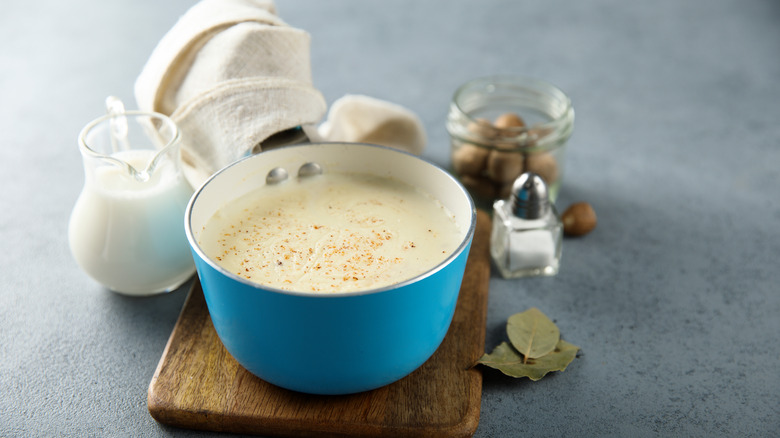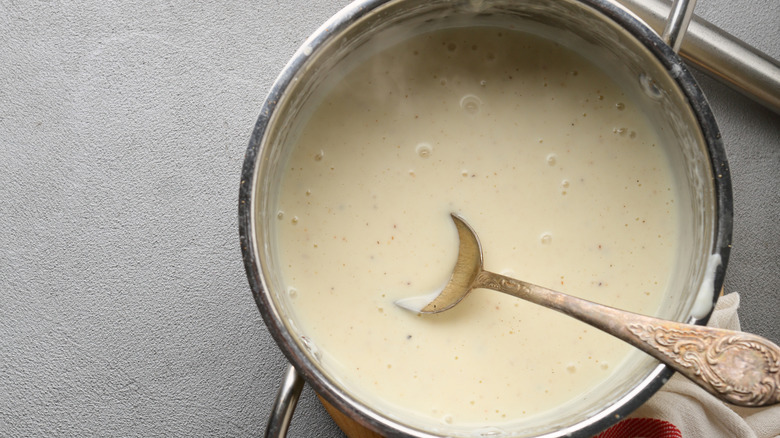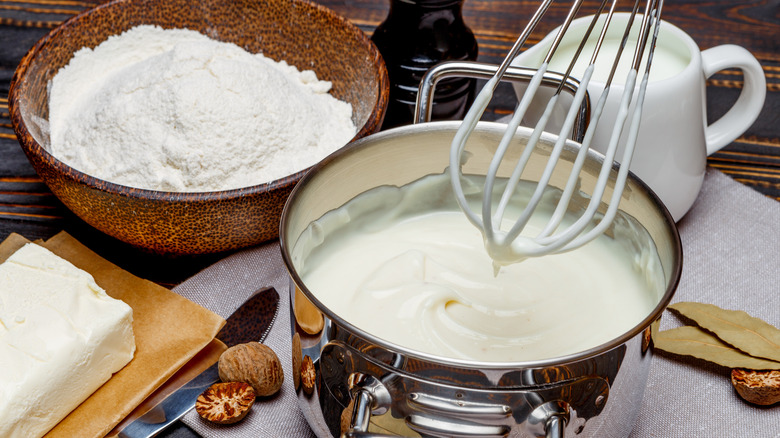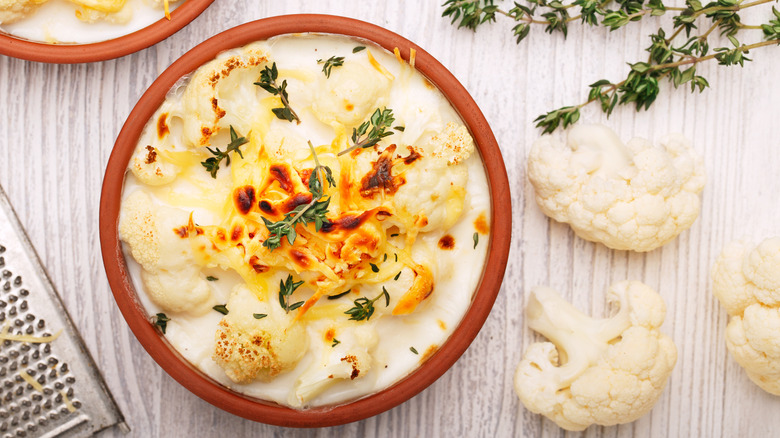What Is Béchamel Sauce And What Is It Used For?
What you call it likely depends entirely on where you are from. In many parts of the country and indeed in many parts of the world, it could be simply known as "white sauce," but to those who have been to culinary school, it may be known as "béchamel sauce." This sauce is known for its exalted position as one of the five "mother sauces" of French cuisine — the other sauces are velouté, espagnole, hollandaise, and a classic tomato sauce. Béchamel and its siblings are meant to mark the beginning of a sauce-related journey, and they all branch out into secondary or "small sauces," each with the same characteristics as the sauces they started as.
While some sauces are meant to add bold flavor to the dishes they are in, Fork+Plate defines béchamel as an ingredient sauce, which means it is either the starring or the support for a wide variety of recipes from creamed vegetable dishes to cheese soufflé.
Where did béchamel come from?
While there are many theories about its origin, béchamel sauce appears to date back to the age of the Medicis, and to when Marie de Medici was sent to France to marry King Henry IV. Accompanying her was a chef that made a cream sauce that had been used in the Italian regions of Tuscany and Emiglia Romagna. But it was not until the 17th century that the famed chef La Varenne wrote of béchamel in "The French Cook." La Varenne talked about making roux — a butter and flour paste — and then using that to make sauces thicker and richer, according to Fork+Plate.
Two other French noblemen claim some credit for inventing béchamel sauce. They are the Duke of Mornay (the supposed inventor of Mornay sauce (béchamel with gruyère and parmesan cheese), as well as the Marquise Louis de Béchamel. The latter was wealthy but had no interest in the kitchen — which most likely meant that he was named for the saucy invention, but could likely not lay any claim to inventing it.
What ingredients go into béchamel sauce and how do you make it?
To make a good béchamel sauce, you'll need to start with fat (butter, ghee, or oil will do) and all-purpose flour in a 1-to-1 ratio to make your roux, or the sauce base. Then, add warm whole milk to that as you slowly mix it all together. The flour, milk, and fat paste will thicken while you slowly whisk, and it will be ready to take off the heat when it is creamy. When you make your béchamel sauce, you may want to heat up the milk before you add it to the butter and flour and then stir until the sauce is medium-thick.
A good béchamel, or white sauce, will have approximately 184 calories for every half cup. Of that, 13.g grams will be fat, 4% will be carbs, while 10% will be protein, per MyNet Diary.
Béchamel in and of itself may not taste too exciting, but its texture can lend itself to just about everything it is mixed into. It has the power to turn thin sauces into hearty gravies or hard, inflexible cheeses into pliant liquids ready to be added to everything from pasta to vegetables.
How do you use béchamel sauce?
A good béchamel sauce has the magical ability to take a dish to the next level. Once the béchamel is made, you might want to add grated cheese to make an oh-so-creamy mac and cheese, or use the sauce as the co-star of a good cauliflower cheese (via BBC Good Food).
Adding a teaspoon of dry mustard to the flour mix will result in a heavenly mustard sauce that any fish or chicken dish would be proud to call its companion. Cooking up béchamel sauce with chopped onions will leave you with soubise sauce, which complements pasta, pork, and lamb. If you choose to leave it plain, or infuse it with nutmeg, you can use it as a layer to make lasagna creamier, as Epicurious recommends. And when mixed with crumbled sausage, it becomes an essential part of a Southern staple: biscuits and gravy.
The best thing about béchamel is that it is a forgiving sauce that doesn't break up when you reheat it. Whether you're adding cheese or simply thyme, nutmeg, or a bay leaf, béchamel is the ultimate starter sauce.



